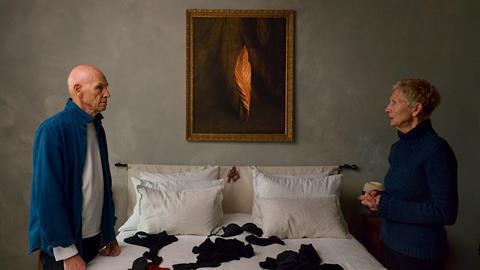US photographer Joel Meyerowitz and his artist wife Maggie Barrett put their 30-year relationship under the microscope

Dirs: Jacob Perlmutter, Manon Ouimet. UK/Denmark/US. 2024. 100mins
After meeting via a chance encounter 30 years ago, world-renowned photographer Joel Meyerowitz, now a lean, still dynamic 84-year-old, and his artist, musician and writer wife Maggie Barrett (an elfin 75-year-old with a cropped pixie cut and a smile that lights up the room) remain deeply in love. But their marriage is not without its challenges and, when Barrett breaks her femur, both are forced to confront their mortality and the realities of ageing. This intimate — sometimes painfully so — and revealing portrait examines how these two creative and unusual individuals work towards a deeper understanding of each other.
A thoughtful, revealing and sometimes profoundly uncomfortable viewing experience
The film is the documentary directing debut of filmmaking team Jacob Perlmutter and Manon Ouimet. Perlmutter, an award-winning street photographer and filmmaker, has worked extensively in music videos and short films, while Ouimet is a Jerwood Award long-listed photographer and artist whose screen work includes a series of short films collectively titled Stimming (2020). With its insights into the creative balance in a relationship between artists, Two Strangers is likely to appeal predominantly to photography and art-world audiences at further festivals.
While fans of Meyerowitz’s work may be surprised by a shift in focus away from his photography and onto his personal life, the candour and courage that both Barrett and Meyerowitz bring to the project make for a thoughtful, revealing and sometimes profoundly uncomfortable viewing experience — at times, it’s like eavesdropping on an unusually tetchy marriage counselling session. At others, the connection between these two fascinating people and the insights into their eventful, fully-lived lives is unexpectedly moving.
A street and landscape photographer, and an early adopter of colour when most photographers still preferred black and white, Meyerowitz has published more than 40 books and exhibited his work around the world. Barrett, a novelist, painter and the composer of pensive, delicate piano pieces that are incorporated into the film, is prolific but less recognised. She says she has felt that her own creative output has been overshadowed by that of her husband.
Meyerowitz and Barrett came from two different worlds. He was born in the Bronx and has a hard-boiled East Coast directness; she is British, the product of an unhappy childhood that segued into four failed marriages, a spell in what she describes as “the nuthouse”, and a period of alcohol and drug addiction. But perhaps even more than the disruption of her early life, Barrett had to contend with the considerable disadvantage of being a female artist in a generation that tended to put more worth on the creative output of men. This gender imbalance, and the way that it is internalised into all aspects of life including their marriage, is one flashpoint between the couple.
Another is the painful realisation that, following Barrett’s accident and subsequent diagnosis of severe osteoporosis, they will need to leave their home in rural Tuscany and relocate to somewhere less challenging. But where? They have an apartment in Brooklyn, but it was the home that Meyerowitz shared with his first wife and family, and so comes filled with claustrophobic baggage.
The directors’ backgrounds in photography and visual arts are evident throughout the film, in framing choices that nod to both the playfulness of Meyerowitz’s early street photography and the more austere beauty of his later shift into still-life work. But perhaps most of all, it shows in the like-minded kinship between filmmakers and subjects, and the remarkable degree of trust that underpins this revealing examination.
Production companies: Manon Et Jacob, Final Cut For Real
International sales: Cinetic Media jason@cineticmedia.com
Producers: Manon Ouimet, Signe Byrge Sørensen, Jacob Perlmutter
Cinematography: Jacob Perlmutter
Editing: Estephan Wagner, Josh Mallalieu
Music: Diogo Strausz






![The Brightest SunScreen[Courtesy HKIFF]](https://d1nslcd7m2225b.cloudfront.net/Pictures/274x183/3/5/0/1448350_thebrightestsunscreencourtesyhkiff_312678.jpg)















![The Brightest SunScreen[Courtesy HKIFF]](https://d1nslcd7m2225b.cloudfront.net/Pictures/100x67/3/5/0/1448350_thebrightestsunscreencourtesyhkiff_312678.jpg)

